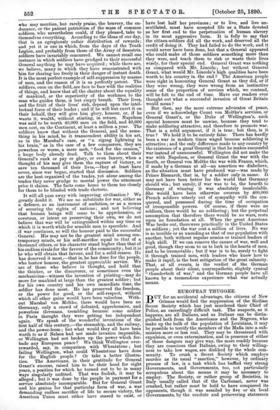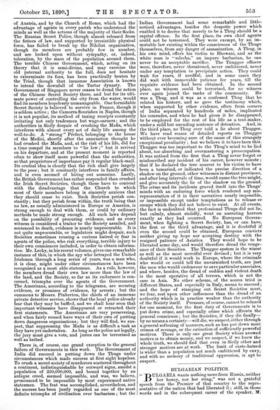EUROPEAN THUGGEE. B UT for an accidental advantage, the citizens of
New Orleans would find the suppression of the Sicilian Secret Society which has just murdered their Chief of Police, an exceedingly difficult task. The suspects, as it happens, are all Italians, and as Italians can be distin- guished both from the Americans and the Negroes, who make up the bulk of the population of Louisiana, it may be possible to terrify the members of the Mafia into a sub- mission more or less real. They may be threatened with expulsion, or even extermination, and in presence of either of those dangers may give way, the more readily because they are conscious that Italians, owing to their willing- ness to take low wages, are disliked by the whole com- munity. To crush a Secret Society which employs murder as its usual " sanction," however, by ordinary process of law, is a task which has baffled very strong Governments, and Governments, too, not particularly scrupulous about the means it may be necessary to employ. The Society, or rather group of Societies, in Italy usually called that Of the Carbonari, never was crushed, but rather must be held to have conquered its opponents, though it was assailed by five or six local Governments, by the resolute and persevering statesmen of Austria, and by the Church of Rome, which had the advantage of agents in every parish who understood the minds as well as the actions of the majority of their flocks. The Russian Secret Police, though almost released from the fetters of law, and supported by irresistible physical force, has failed to break up the Nihilist organisation, though its members are probably few in number, and are looked upon without sympathy, or, indeed, toleration, by the mass of the population around them. The terrible Chinese Government, which, acting on its theory that it is semi-divine, and may exercise the old paternal authority to the full, does not hesitate to exterminate its foes, has been practically beaten by the Triad, though that immense Association is known to intend the downfall of the Tartar dynasty. The Government of Singapore never ceases to dread the action of the Chinese Secret Society there, and but for its ulti- mate power of controlling the city from the water, would find its members hopelessly unmanageable. One formidable Secret Society is believed to survive in France, though it is seldom active ; the Camorra flourishes in Naples, though it is not popular, its method of taxing receipts constantly irritating not only tradesmen but wage-earners ; and the authorities in Sicily despair of crushing the Mafia, which interferes with almost every act of daily life among the well-to-do. A " strong " Prefect., belonging to the house of the Medici, shortly after the annexation thought he had crushed the Mafia, and, at the risk of his life, did for a time compel its members to " lie low ;" but it revived on his departure, and at the present moment is reported often to show itself more powerful than the authorities, so that proprietors of importance pay it regular black-mail. Its central idea is clearly that the rich shall give largely to the poor; but it constantly interferes in family affairs, and is even accused of hiring out assassins. Lastly, the British Government has rather suspended than crushed the Irish Secret Societies, though these have to contend with the disadvantage that the Church to which most of their members belong is sincerely anxious that they should cease to exist. Such Societies perish con- stantly; but they perish from within, the truth being that no law, as usually administered in Europe or America, is strong enough to deal with them, or could by ordinary methods be made strong enough. All such laws depend on the possibility of procuring evidence, and as every witness is considered a traitor to the Society assailed, and sentenced to death, evidence is nearly unprocurable. It is not quite unprocurable, or legislators might despair, such Societies sometimes rousing a curious hatred or fear in agents of the police, who risk everything, terrible injury to their own consciences included, in order to obtain informa- tion. Mr. Lecky, in his recent volumes, gives one remarkable instance of this, in which the spy who betrayed the United Irishmen through a long series of years, was a man who, it is clear, might under other circumstances have been recognised as a most able statesman. As a rule, however, the members dread their own law more than the law of the land, and the Society, so far as its endurance is con- cerned, triumphs over the agents of the Government. The Americans, according to the telegrams, are securing evidence, or promises of evidence, by arrests ; but the summons to Messrs. Pinkerton, the chiefs of an immense private detective service, shows that the local police already fear that they may be baffled, and we shall hear soon that important witnesses have disappeared or retracted their first statements. The Americans are very persevering, and when fairly roused have ways of their own of putting down dangerous organisations ; but they will find, we sus- pect, that suppressing the Mafia is as difficult a task as they have yet undertaken. As long as the police act legally, the jury must give a vote, and juries can be terrorised as well as bribed.
There is, of course, one grand exception to the general failure of Governments in this work. The Government of India did succeed in putting down the Thugs under circumstances which made success at first sight hopeless. To crush a secret society of murderers scattered throughout a continent, indistinguishable by outward signs, amidst a population of 250,000,000, and bound together by an antique creed, seemed impossible, and was, we believe, pronounced to be impossible by most experienced native statesmen. The feat was accomplished, nevertheless, and the success has been justly regarded as one of the most definite triumphs of civilisation over barbarism ; but the Indian Government had some remarkable and little- noticed advantages, besides the despotic power which enabled it to decree that merely to be a Thug should be a capital offence. In the first place, its own chief agents could not be terrorised. They were exempt, by an im- mutable law existing within the consciences of the Thugs themselves, from any danger of assassination. A Thug, in his own mind, offers his victim to Bhowani, and as the white man is " mlecha," an impure barbarian, he can never be an acceptable sacrifice. The Thuggee officers were, therefore, never threatened, never embittered, never under any temptation to precipitate action. They could wait for years, if needful, and in some cases they did wait with immovable patience for years, till the requisite evidence had been obtained. In the second place, no witness could. be terrorised, for no witness ever again joined the ranks of the community. He was a Thug, and it was as a confessed Thug that he related his history, and so gave the testimony which, when supported by other evidence, often from corners of India separated by hundreds of miles, implicated his comrades, and when he had given it he disappeared, to be employed for the rest of his life as a tent-maker, under a mild but unending sentence of detention. And, in the third place, no Thug ever told a lie about Thuggee. We have read reams of detailed reports on Thuggee without ever becoming sure of the cause of this strangely exceptional peculiarity ; but we believe it to have been this. Thuggee was too important to the Thug's mind to be lied about, too absorbing and overmastering a preoccupation. It was noticed from the first that a Thug never forgot or misdescribed any incident of his career, however minute ; that if he declared the tree nearest to his victim to have been a tamarind, or indicated the precise direction of a shadow on the ground, other witnesses in distant provinces, and after long intervals of time, would name the tree aright, and give accurately the lie of the shadow on the ground. The crime and its incidents graved itself into the Thugs' minds with an enduring force which rendered any mis- representation of it in their narratives nearly impossible, or impossible except under temptations as to release or escape which they did not believe to exist. At all events, the fact is undoubted that professional Thugs did not lie, but calmly, almost stolidly, went on narrating horrors exactly as they had occurred. No European Govern- ment, when fighting a Secret Society, has, or can have, the first or the third advantage, and it is doubtful if even the second could be obtained, European convicts neither giving up hope nor accepting destiny with the resigned patience of Asiatics. They would hope to be liberated some day, and would therefore dread the venge- ance of their Societies. The Thuggee system is the wisest as well as the most merciful ever devised ; but it is very doubtful if it would work iu Europe, where the criminals who would or could tell the unvarnished truth, are just the men who would endeavour to save particular associates, and where, besides, the dread of sudden and violent death is the most operative of all terrors, which is not the case in Asia. No other scheme, of the scores tried in different States, and especially in Italy, seems to succeed ; and the hope of stamping out Secret Societies must, we fear, rest upon other influences than the dread of an authority which is in practice weaker than the authority of the Society itself. Pressure, of course, cannot be relaxed for one moment, for the first duty of Governments is to put down crime, and especially crime which affronts the general conscience ; but the Societies, if they die finally— by no means a certainty—will die, we suspect, either through a general softening of manners, such as has put down most crimes of revenge, or the extinction of sufficiently powerful motives. There is only one great Society whose avowed motive is to obtain money, and we suspect, if we knew the whole truth, we should find that even in Sicily other and stronger motives are at work. The limit of caste-hatred is wider than a population not much embittered by envy, and with no memory of traditional oppression, is apt to suspect.







































 Previous page
Previous page